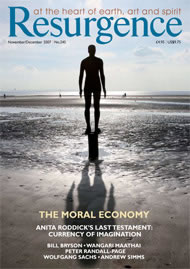I DON’T POSSESS a Tesco Clubcard. I’m not exactly unusual in this, but there are 25 million of them in wallets and purses out there across the UK, which is getting on for half the population.
One reason I don’t have one is that I never shop there. When I discern that the organisation I am giving my custom to aspires to world domination, I feel less enthusiastic about spending money with them. Now, having read Andrew Simms’ scintillating critique of the mega-chain store, I will certainly not be adding a Clubcard to my collection.
One of the fascinating revelations in the book is just how much data they keep on the 10 million people who are actively using their cards. Their names, addresses and mobile phone numbers, of course, but also their socio-economic profiles, where they shop and when, which magazines they buy, which brands they are particularly loyal to, whether they have pets, and a range of other details about purchases and habits. Even more disturbing is the prospect of the government’s plans to link biometric data on their ID cards with the supermarket data on all of us.
Privacy this isn’t. Nor is it much benefit, either. Simms reveals that, to earn enough points to get one of the much-heralded computers for your school, you have to spend a quarter of a million pounds with Tesco.
I have to declare an interest reviewing the book. I worked with the author at the New Economics Foundation on the Clone Town campaign, and a fascinating experience it was. The report Clone Town Britain may not have rescued our high streets from homogenisation, but it did introduce into the language a potent phrase that has a momentum of its own.
The mere expression ‘clone town’ seems to carry within it the determination that something should be done. But what the Tescopoly book reveals is the dangers beyond that of our lax competition regulation.
It isn’t just that everywhere looks the same, but the devastating effect on the diversity of so many other areas of life. Community pharmacies, local bookshops, any kind of agriculture but massive agri-business, the diversity of landscape, all suffer from allowing supermarket chains to take too great a control over our lives.
Nor is the book just about Tesco. Simms manages to combine controlled anger at the rise of supermarket monopolies with a personal approach to confronting the monster. He has a talent for the pert and provocative metaphor. A riposte in The Guardian shows that Tesco is still squirming about his metaphor of an invasive species like Japanese knotweed.
The result is a witty, revealing and thought-provoking book. It is also a tremendously important one. What it taught me was partly that supermarket homogenisation leads to human homogenisation if we let it. It taught me also to think a little differently about the original purpose of free trade – and how we face a situation soon, if we are not careful, where we will have little or no choice about where we shop.
But what I most took from the book was how the trick has been played. It’s strange, because supermarkets are so much part of modern life – rather like banks – that we rarely if ever think to look at their inner workings, the combination of land banks, road haulage and fearsome technocratic and virtual just-in-time systems.
When I did look, one fact rose rather horrifyingly to the top. Tesco’s semi-monopolistic position allows it to dictate terms to its suppliers, to insist on contracts that require payment in ninety days – rather than the normal thirty-day periods normal for its smaller competitors.
The result is that Tesco funds its expansion with what is in effect a £2 billion interest-free loan equal to its entire stock. So if anyone tells you Tesco’s massive expansion is just about supply and demand, remind them of this – how monopoly gives staggering economic advantages over anyone who dares compete.
For that reason, I can think of no higher praise for Tescopoly than saying that it is a supremely dangerous book. Its evident success must be making the Tesco board quake in their technocratic boots.








